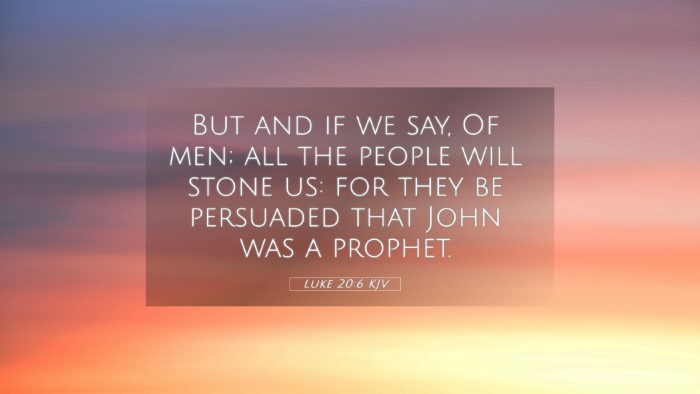Understanding Luke 20:6
Luke 20:6 states: "But if we say, 'From men,' all the people will stone us, for they are persuaded that John was a prophet." This verse is part of a significant exchange between Jesus and the religious leaders of His time and demonstrates the tension that often existed between Him and the authorities.
Summary of Bible Verse Meaning
In this passage, the religious leaders are confronted with a dilemma regarding the authority of John the Baptist. They recognize that answering Jesus' question could lead to severe consequences, illustrating their fear of public opinion and their unwillingness to acknowledge the truth. The hesitance of these leaders is a depiction of the broader theme of rejection of prophetic voices in favor of human validation.
Insights from Public Domain Commentaries
-
Matthew Henry's Commentary:
Henry emphasizes the predicament the religious leaders find themselves in. They understood that the public had a significant regard for John the Baptist as a prophet. Therefore, admitting his prophetic role would imply admitting the truth of Jesus’ authority as well. This highlights their political motivations over spiritual truths.
-
Albert Barnes' Notes:
Barnes points out the irony in the leaders' recognition of John’s authority while simultaneously rejecting the implications of that authority for their own teachings. He highlights the fear they had of losing favor with the people which calls into question their integrity.
-
Adam Clarke's Commentary:
Clarke elaborates on the public's reaction to John, suggesting that they could see him as a true prophet due to the genuine nature of his call to repentance. He indicates that the leaders’ reluctance to engage honestly with Jesus regarding John the Baptist reveals the corrupt spiritual state of the leadership.
Thematic Connections and Cross-References
The themes found in this verse connect to various biblical narratives and teachings, demonstrating inter-Biblical dialogue and reinforcing the idea of prophetic acknowledgment.
Related Bible Verses
- Matthew 21:26 – A parallel account where the religious authorities fear the people's reaction regarding Jesus' authority.
- Luke 7:29-30 – Reflects on the people's acceptance of John and the leaders' rejection of his baptism.
- John 1:19-27 – Discusses the identity and role of John the Baptist in relation to Jesus.
- Acts 13:25 – References John’s ministry in the context of prophecy and the coming of Jesus.
- Mark 11:32 – Similar to Matthew 21:26, noting the leaders' fear of public opinion.
- Luke 3:15-18 – Describes John’s prophetic role and the people's expectations of him.
- Matthew 3:1-3 – Introduces John the Baptist's ministry as a fulfillment of prophecy.
- 2 Chronicles 36:16 – Highlights the theme of rejecting prophets and the consequences of such actions.
- Jeremiah 7:25 – Offers a historical perspective on the rejection of prophets and God's messengers.
- Acts 7:51 – Stephen points out Israel’s history of resisting the Holy Spirit and the prophets.
Exploring the Significance of Cross-Referencing
To enhance understanding, employing tools for Bible cross-referencing is invaluable. Effective cross-reference Bible study enables deeper insights into connections such as the one analyzed here in Luke 20:6.
Recognizing connections between Bible verses like John’s prophetic acknowledgment and the leaders' subsequent rejection allows for a richer understanding of the biblical narrative.
Bible Cross-Reference System
Utilizing a bible concordance or a bible cross-reference guide can aid in identifying connections between Old and New Testament scriptures. This analytical approach can bridge contextual gaps and highlight themes, giving a more comprehensive view of the Bible's message.
Conclusion
The examination of Luke 20:6 reveals the intricate dynamics of biblical authority, public perception, and prophetic recognition. By engaging with public domain commentaries and utilizing various bible reference resources, believers can enhance their understanding of scripture, cultivate a more profound faith, and effectively utilize bible cross-reference systems for personal or collective study.












